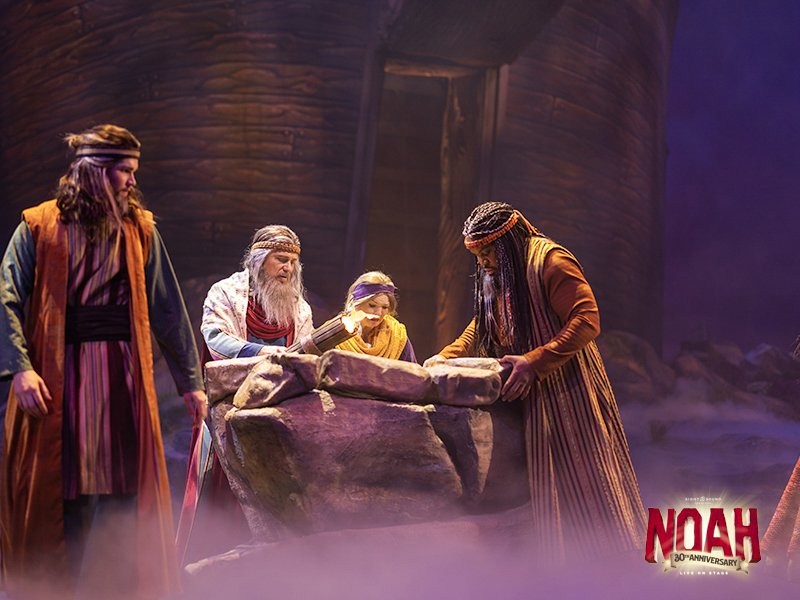NOAH: A Message of FaithfulnessSample


Praise God
Praising God is not just an action—it’s a posture of the heart, a lifestyle, and a declaration of where our hope lies. In Scripture, there are rich and varied expressions of praise, especially in the original Hebrew language.
- Tehillah
- A song of praise, often spontaneous and heartfelt.
- Yadah
- This form of praise means to acknowledge God with extended hands in thanksgiving
- Towdah
- This word also speaks of thanksgiving, but with a sense of sacrifice—praising God, trusting Him even when the answer hasn’t come.
- Barak
- To barak is to kneel, to bless, to bow low in reverence.
- Shabach
- This is loud, bold, and victorious praise. It’s the shout of triumph, the declaration of God’s might and goodness in the face of opposition or after a miraculous victory.
- Halal
- To halal is to boast about the Lord with abandon. It’s where we leap, dance, and rejoice with all our being. This is the word from which “hallelujah” comes.
In the story of Noah, we witness a life steeped in reverence and unwavering praise. One of the most striking moments comes after a century of labor—100 relentless years of building—and 371 harrowing days confined in the belly of the Ark. When Noah and his family finally step out onto dry ground, the world that greets them is unrecognizable. Imagine emerging from the dim, enclosed belly of a wooden vessel saturated with the stench of animals and human survival—musky fur, stale hay, the sharp tang of waste—and being hit by the crisp, raw air of a world reborn. The sky is clearer, eerily quiet, the landscape reshaped by raging waters. Perhaps there are signs of devastation—twisted trees, scattered bones, a silence heavy with absence. It must have been overwhelming: grief for what was lost, awe at what remained, fear of the unknown ahead. And yet, before building a shelter or searching for food, Noah’s instinct is to build an altar. To stop, kneel, and offer praise—not in comfort, but in the wake of catastrophe and the dawn of the unknown. In that moment, worship wasn’t a ritual. It was a declaration: that God is worthy to be praised.
Whether it’s through music, quiet reflection, writing, serving others, or lifting your hands in church, praise is not confined to a single form. What matters most is that we do praise. Not only are we invited to praise God in Scripture — we are commanded to. Scripture also tells us when to praise: at all times.
But let’s be honest: we don’t always feel like praising. There are seasons of grief, confusion, or even numbness. Sometimes we simply forget to praise God. Praise might not come naturally when we’re hurting—but that’s exactly when it becomes most powerful. In those moments, praise is not just an emotion—it’s a choice. It’s a weapon. It’s a declaration that can defy our circumstances by declaring that God is good, sovereign, and worthy.
Every human heart is wired to worship. We will all place something at the center of our affection and attention—whether it’s success, security, people, or pleasure. But only God is worthy. And only He can satisfy.
Choosing a life of praise keeps our hearts aligned and our vision clear. It reminds us who God is, who we are, and what truly matters. It lifts our gaze from the temporary to the eternal. Like Noah, join all of creation in praising your Creator.
Scripture
About this Plan

Do you desire to live faithfully in the midst of an increasingly chaotic world? Inspired by Sight & Sound Theatres® production, NOAH, this seven-day biblical study invites you on a journey alongside one righteous man who’s trust in God’s promises ran deeper than the rising waters around him.
More
Related plans

Commissioned: Passion to Purpose: Living the Great Commission

Worship With Wonder: 3 Days of Awe

Renewing Your Heart for Ministry

Knowing God: Pray Through His Attributes

Following the Call of Jesus

5 Minutes That Change Everything: Meeting God in the Moments

Prayers From a Tired Mama's Rocking Chair

Finding Peace and Wholeness in Jesus
